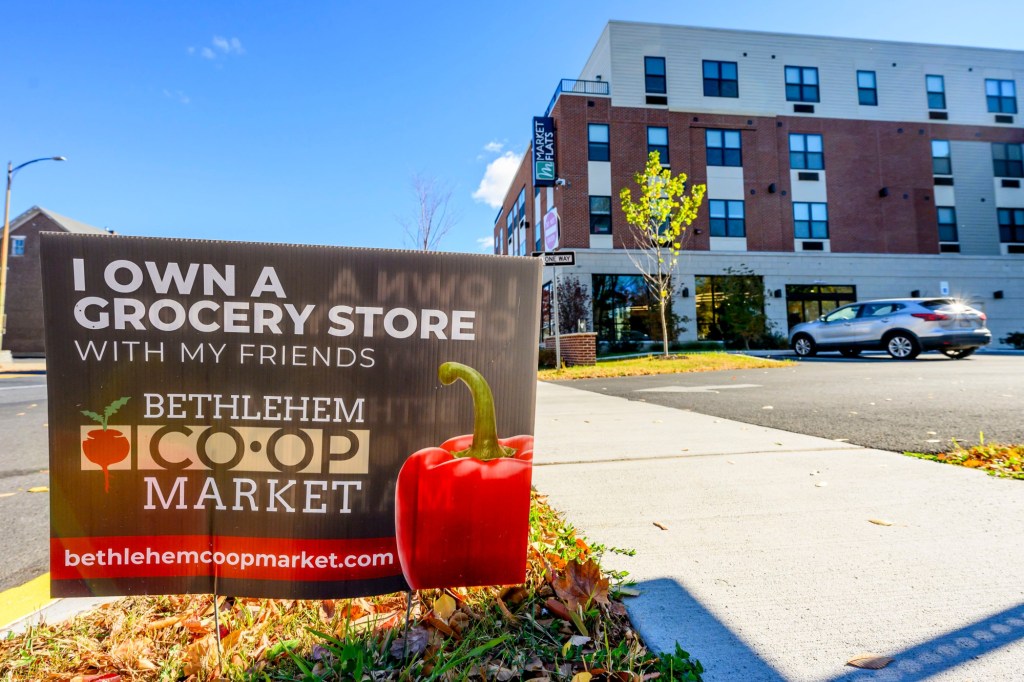The Bethlehem Co-op Market, an initiative founded in 2011 and originally set to open in 2022, has yet to welcome customers to its north Bethlehem store, despite millions of dollars raised for the community-owned grocery effort.
The delays have prompted public questions and speculation about the co-op’s finances, although market leaders say that financial challenges from the pandemic and inflation are behind the delays, and that money has been spent appropriately.
The Morning Call toured the co-op facility in 2024, at which point leaders said they plan to open their doors this year. However, the co-op has since pushed back its opening date indefinitely.
A grocery co-op is a business model where anyone can buy a store “membership” and have an ownership stake in the store. Although anyone can shop there, not just members, a $300 one-time co-op membership grants discounts, voting rights on the store’s offerings, and equity if and when the store is profitable.
The store will offer products from brands that are exclusive to grocery co-ops, which also allows the store to source its merchandise at a lower price than regular grocery stores. It also will carry items from local farmers and producers. The Co-op’s location, at 240 E Broad St. in the city’s “Northside Alive” neighborhood, is considered a food desert, so its opening will help increase its neighbors’ access to fresh groceries.
Domenic Breininger, chair of the co-op market board, said the final hurdle the co-op faces toward setting an opening date is finding a contractor that can connect the store’s refrigerators to the building’s cooling system, which is on its top floor. Once it secures that contract and begins work, the building will be eligible for a certificate of occupancy and leaders can announce an opening date.
“There are not a lot of options when it comes to who performs that kind of work, so we have been working with our main construction contractor, Boyle Construction, to find people to do the work,” Breininger said in an interview.
Still, there is growing skepticism among some residents about the co-op’s opening, and in particular, its use of a $2.9 million federal grant secured by then-U.S. Rep. Susan Wild in 2021. The co-op also received a $100,000 state grant via state Sen. Lisa Boscola’s office.
“What is the city doing regarding tax dollars present to support the Bethlehem co-op fiasco? The money could have and should have been allocated to address the homeless issue,” Bethlehem resident Mary Jo McCool said at a recent City Council meeting.
Bethlehem Department of Community and Economic Development Director Laura Collins said that because the funds are specifically allocated as a grant for the co-op’s purposes, the city could not redirect funding toward homelessness or any other unrelated issue.
Further, Collins said that there are strict reporting requirements that the co-op follows in order to receive the money from its federal grant. The city acts as a “pass-through” to transfer funds from the federal government to the co-op, and funding is given out on a reimbursement basis. The co-op must make the purchases and contractor payments before actually seeing money coming in, which meant the market needed a bank loan before it could actually begin to spend any of the money in the first place.
“There are very robust checks and balances on how that money is spent,” Collins said at a City Council meeting last week.
Jeff Ward, a former Bloomberg news and WFMZ web reporter, has also criticized the co-op management and delays on his blog Lehigh Valley News Briefs, and has called for more financial transparency from its leaders.
“It’s time for the City of Bethlehem, the State of Pennsylvania and the federal government — all gave the Boondoggle money — to step up and demand accountability,” Ward wrote.
The co-op sends out a weekly newsletter, and people can ask questions or make comments at board meetings on the third Monday of each month, which are open to the public.
In a recent co-op newsletter, a financial breakdown revealed that the co-op has thus far spent $4.5 million on expenses including equipment, construction, rent and occupancy and personnel, and has about $233,000 remaining.
The co-op has depleted its $2.9 million federal grant, Breininger said: it has been reimbursed for the vast majority of that funding and has submitted receipts for all other expenses covered by the grant.
“We are all very aware of some of the concerns that are being voiced and we understand all the questions and we are more than happy to answer any of them and happy to have people out at our board meetings talking to us, offering any suggestions,” Breininger said.
There are inherent challenges to any business, Breininger said, but the co-op model, where the store relies on community fundraising in order to open and sustain operations and decisions are made in a democratic fashion among member-owners, makes it that much more difficult.
The board also is continuing to fundraise for what it calls its sustainable future campaign. The fundraiser has reached its Phase 1 goal of $600,000, which is enough to allow the co-op to open its doors once it has the refrigeration work in place. It is seeking an additional $1 million to help it keep its doors open throughout its first year, which Breininger said is often the most challenging for co-ops. Additional fundraising will also help the co-op pay off its high-interest loans, freeing money to improve the store’s offerings, he said.
Breininger said that the co-op and its over 1,700 members eagerly await an official opening date.
However, Ward, who is not a member, said in an interview he remains dissatisfied with the co-op and its response to criticisms.
“They said [the co-op’s funding] was spent legally,” he said, “but does that mean it was spent wisely?”
Reporter Lindsay Weber can be reached at Liweber@mcall.com.

